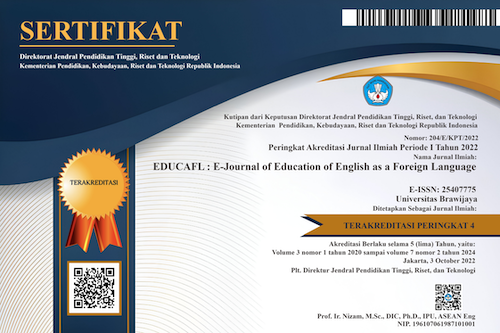EFL STUDENTS' ONLINE LEARNING: EPISTEMIC BELIEFS DETERMINE LEARNING STRATEGIES
DOI:
https://doi.org/10.21776/ub.Educafl.2019.002.02.05Keywords:
EFL, Epistemic beliefs, Learning Strategies, Online LearningAbstract
This study aimed to examine EFL students' cognitive processing, notably based on their epistemic beliefs views and learning strategies towards self-directed online learning. A descriptive quantitative method was used to explore 100 students' learning strategies. The focus is on examining individual knowledge construction through active cognitive engagement on English language exposures and aquisition in online community. The results suggest that students with more sophisticated epistemic beliefs have different learning strategies compare to those who posses simple ones. Students' characteristics which appear to impact their use of learning strategies are discussed. Suggestions for instructional strategies are offered.
References
Angeli, C., Valanides, N., & Bonk, C.J. (2003). Communication in a web-based conferencing system: The quality of computer-mediated interactions. British Journal of Educational Technology, 34(1), 31–43.
Andrew W. Cole, Lauren Lennon & Nicole L. Weber (2019): Student perceptions of online active learning practices and online learning climate predict online course engagement, Interactive Learning Environments.
Chen, C.Y and Pedersen, S. (2012). Learners’ internal management of cognitive processing in online learning. Innovations in Education and Teaching International Vol. 49, No. 4, 363–373
Cheng, K.-H., Liang, J.-C., & Tsai, C. C. (2013). University students' online academic help-seeking: The role of self-regulation and informations commitment. Internet and Higher Education, 70-77.
Chiu, Y.-L., Liang, J.-C., & Tsai, C.-C. (2013). Internet-specific epistemic beliefs and self-regulated learning in online academic information searching. Metacognition and Learning.
Doris U. Bolliger & Florence Martin (2018): Instructor and student perceptions of online student engagement strategies, Distance Education.
Emaliana, I. (2017). Correlation between EFL Epistemic Beliefs and English Language Proficiency among Indonesian EFL Students. Disertation. Graduate Program in English Language Teaching, State University of Malang.
Emaliana, I & Lailiyah, N. (2018). Sophisticated Epistemic Beliefs: An Interpretative Phenomologiccal Analysis of Students’ Task-Based Learning Experiences. ERUDIO (Journal of Educational Innovation), Vol. 5, No. 1. 124-135.
Franco, G. M., Muis, K. R., Kendeou, P., Ranellucci, J., & Sampasivam, L. (2012). Examining the influences of epistemic beliefs and knowledge representations on cognitive processing and conceptual change when learning physics. Learning and Instruction, 62-77.
Hogan, K. (1999). Relating students’ personal frameworks for science learning to their cognition in collaborative contexts. Science Education, 83(1), 1–32.
Hongqin Zhao & Steven Coombs (2012) Intercultural teaching and learning strategies for global citizens: a Chinese EFL perspective, Teaching in Higher Education, 17:3, 245-255.
Huang, Heng-Tsung Danny. (2016). Exploring Startegy Use in L2 Speaking Assessment. National Taiwan University.
Hwang, Myunghwan., & Lee, Hee-Kyung. (2017). Development And Validation Of The English Writing Strategy Inventory, System 68 60-71.
Kanuka, H., Rourke, L., & Laflamme, E. (2007). The influence of instructional methods on the quality of online discussions. British Journal of Educational Technology, 38(2), 260–271.
Ketabi, S. (2014). Pre-service English Teachers’ Epistemological Beliefs and Their Conception of Teaching. International Journal of Research studies in Psychology, 3 (1). 3-12.
King, P, M, & Kitchener, K, S. (1994). Developing Reflective Judgment: Understanding and Promoting Intellectual Growth and Critical Thinking in Adolescents and Adult. San Francisco, CA: Jossey-Bass
Kuan-Ming Shen, Tung-Lin Li & Min-Hsien Lee (2018): Learning biology as ‘Increase ones’ knowledge and understanding’: studying Taiwanese high school students’ learning strategies in relation to their epistemic views and conceptions of learning in biology, International Journal of Science Education
Moore, M.G. (2002). What does research say about the learners using computer-mediated communication in distance learning? American Journal of Distance Education, 16(2), 61–64.
McLoughlin, C., & Lee, M. J. W. (2010). Personalised and self-regulated learning in the Web 2.0 era: International exemplars of innovative pedagogy using social software. Australasian Journal of Educational Technology, 26, 28–43.
Mokhtari, K., Shoerey, R. (2002). Measuring ESL Students’ Awareness of Reading Strategies. Journal of Developmental Education 25,3
Marcellino, M. (2005). Competency-based Language Instruction in Speaking Classes: Its Theory and Implementation in Indonesian Context. Indonesian Journal of English Language Teaching, Vol. 1, No. 1.
Silva, Radhika, De. (2015). Writing Strategy Instruction: Its Impact On Writing In A Second Language For Academic Purposes. Sage. Language Teaching Research 2015, Vol. 19(3) 301– 323. Sri Lanka.
Schellens, T., & Valcke, M. (2006). Fostering knowledge construction in university students through asynchronous discussions groups. Computers & Education, 46(4), 349–370.
Downloads
Published
Issue
Section
License
Authors who publish with this journal agree to the following terms:
- Authors retain copyright and grant the journal right of first publication with the work simultaneously licensed under a Creative Commons Attribution License that allows others to share the work with an acknowledgement of the work's authorship and initial publication in this journal.
- Authors are able to enter into separate, additional contractual arrangements for the non-exclusive distribution of the journal's published version of the work (e.g., post it to an institutional repository or publish it in a book), with an acknowledgement of its initial publication in this journal.
- Authors are permitted and encouraged to post their work online (e.g., in institutional repositories or on their website) prior to and during the submission process, as it can lead to productive exchanges, as well as earlier and greater citation of published work (See The Effect of Open Access).



